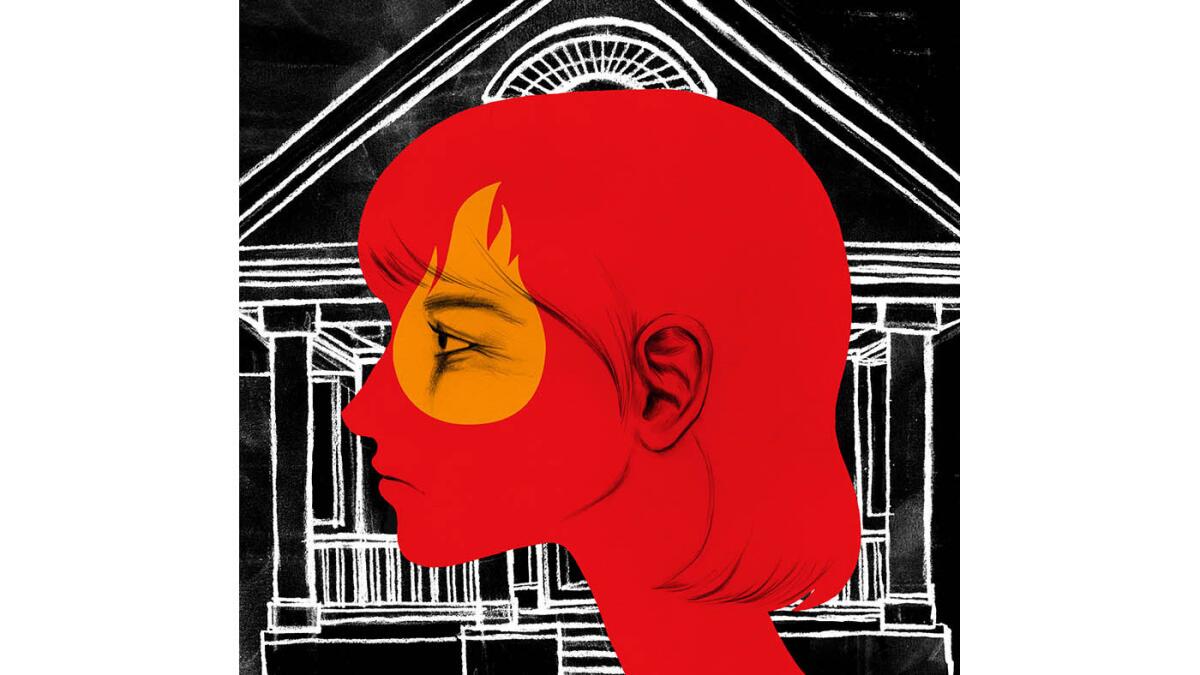Review: Loss and attraction power Maria Flook’s ‘Mothers and Lovers’

Late in her fourth novel, “Mothers and Lovers,” Maria Flook invokes Frank O’Hara’s essay “Personism.” When it comes to poetry, she writes, O’Hara argued that “[y]ou just go on your nerve. If someone’s chasing you down the street with a knife you just run, you don’t turn around and shout, ‘Give it up! I was a track star for Mineola Prep.’”
The same might be said of this book, which has the headlong quality of a writer making it up as she goes along.
At times, that’s a good thing: The story of April, an English professor at Sinclair College, a third-rate institution in Providence, R.I., “Mothers and Lovers” plays around the edges of the academic novel while remaining too dark, too weird to fit the category. At others, the characters slip the bounds of control, acting in ways we’re not quite sure they would.
But then, Flook might say, this is the point — that we are unpredictable, governed by lust and instinct as much as (or more than) any rational override. Certainly, that’s the case with 40-year-old April, who is sleeping with the college provost while not quite fending off the advances of Blaze, her 16-year-old juvenile offender neighbor, as well as those of Townsend, his sixtysomething dad.
Flook is no stranger to the territory of sexual, or romantic, ambiguity. Her first novel, “Family Night,” which received a 1992 PEN/Hemingway Special Citation, involves a triangle among a woman, her stepbrother and her boyfriend, and her 1998 memoir, “My Sister Life,” traces the tensions and disconnections of her own family, etched in stark relief after her older sister Karen runs away from home at age 14.
“When a loss occurs,” Flook observes there, “it occurs in perpetuity; it keeps regenerating like a flowering vine.” Such a line resonates throughout her work.
In “Mothers and Lovers,” the loss belongs to April; her boyfriend, Riley, dies not long before the book begins, precipitating her move from Providence to more rural quarters in East Westerly. It also belongs to Blaze, who is a repeat offender, and his father, let go from his job at a local board game manufacturer after participating in an embezzlement scheme. Most of all, perhaps, it belongs to Janice, Blaze’s mother, who lives with an abusive boyfriend and visits her own discomforting abuses on her son. “It was useless to fight visions of Janice,” the boy thinks. “Janice was an eternal flame.”
To explore these loops, these circling relationships, Flook rotates among her characters, writing chapters from a variety of points of view. It’s an effective strategy, for everyone keeps schemes and secrets from the others; in the kaleidoscopic movement of “Mothers and Lovers,” we get to know them all.
Even so, the pillars of the book remain April and Blaze, who circle each other warily, a dynamic that could go a number of ways. “Her sudden maternal impulse for Blaze was acceptable,” Flook notes of the former, “but she felt uncomfortable when it was spiked by something gnawingly sexual. She was all mothers and lovers.” The conflation is both fascinating and disturbing — source of the novel’s title but also emblematic of a confusion that they share.
For April, this manifests in her ill-advised affair with the provost, which grows complicated when he stands in the way of her promotion to department chair. “So tell me, do I get the chair job or what?” she asks after one assignation, to which he responds, “Not here, … okay, sweetheart? We don’t want to talk business while we’re visiting.”
Blaze is more of a wild card, full of rage but also tenderness, more than a boy if not quite yet a man. “He was learning a kind of interior life,” Flook tells us, “that might help him later on, or it might cause worse problems. An examined life without any mentor is a kettle of slithering worms, but he liked thinking about serious things. Of course, he also thought about sex and guns.”
That’s a terrific passage, reminding us that even a 16-year-old contains multitudes, that everything is more than we take it for. Still, as “Mothers and Lovers” progresses, it begins to feel a little histrionic, as if it were not entirely to be believed.
“Every time she looked out her window,” April reflects, “something more absurd was happening.” This may be true, but I keep coming back to nerve.
Writers, as O’Hara suggests, need nerve — how else to face the blank page, its awesome and terrifying possibilities? But nerve must be tempered also; you can’t go on instinct all the time.
That’s what the latter pages of this novel feel like — as if Flook were following her intuition, which sometimes takes her into scenes and situations that come off as less articulated than they might.
I think of the trip April and Blaze take to confront the provost, a decision that (for her, anyway) pushes the bounds of credibility. Or the final interaction between Blaze and Janice, which for all its tragic tumult, never fully resonates. You can call this a loose end or an aesthetic choice, but it doesn’t really work as either; instead, it just feels underdone. So too Townsend’s run-in with the authorities over illegally dumping toxic sludge near conservation land, a complication that quickly evaporates.
What I’m saying is that, despite its characters’ dimensionality, “Mothers and Lovers” doesn’t carry the necessary consequence. These people may be dealing with real issues, yet almost no one pays a lasting price. Death, the law, a sense of the future — all of it fades in the end. “Focus! Focus on the shore,” Blaze implores his mother, but that shore does not seem distant or treacherous enough.
Mothers and Lovers
A novel
Maria Flook
Roundabout Press: 378 pp., $15.95 paper
More to Read
Sign up for our Book Club newsletter
Get the latest news, events and more from the Los Angeles Times Book Club, and help us get L.A. reading and talking.
You may occasionally receive promotional content from the Los Angeles Times.









